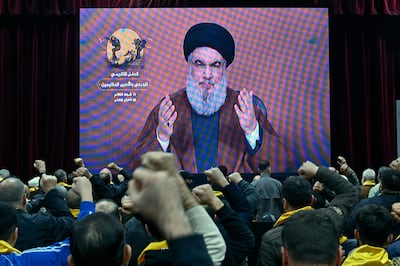If one were to take 1948 as its starting point, the Palestinian-Israeli conflict has needed a solution for more than three quarters of a century. That is more than seven decades of suffering, occupation and, for too many Palestinians, displacement. If anything is to be learned from this, it is that forcing people from their homeland leads not to security but lasting grievance, antagonism and resistance.
Sadly, the devastating war in Gaza shows that this lesson is not being learnt. Speaking at the World Governments Summit in Dubai on Tuesday, Arab League Secretary General Ahmed Aboul Gheit got to the heart of the matter when he said: “The mentality to displace Palestinians and leave the Gaza Strip empty for Israelis to take over leaves a confrontation for the next 100 years.”

Although there is no official Israeli government policy to facilitate the return of its citizens to illegal settlements in Gaza – these were unilaterally evacuated in 2005 – there are worrying pronouncements from Israeli members of cabinet that new plans of displacement are being thought of. A major conference in Jerusalem at the end of January – which was attended by several Israeli ministers – heard calls for an occupation of Gaza, complete with maps showing proposed settlements and outposts.
Meanwhile, images have emerged of Israeli soldiers in the war-torn enclave making clear their desire to see Gaza reoccupied. One soldier in Gaza filmed himself amid ruined buildings in November saying: “Occupying, deporting and settling. Did you hear that Bibi [Israeli Prime Minister Benjamin Netanyahu]? Occupying, deporting and settling.” Other soldiers have taken pictures from Gaza brandishing banners harking back to the 2005 evacuations and calling for re-settlement.
Dangerous enthusiasm for displacement is to be found elsewhere in this conflict. On the same day that Mr Aboul Gheit was warning against driving Palestinians from Gaza, Hezbollah leader Hassan Nasrallah told supporters that 100,000 Israelis had been displaced from northern Israel due to the fighting since October 7, and warned that in an all-out war this number would rise sharply. “You will have to find a place to shelter two million people from the north,” he said.
The reality is this: fantasies or threats of driving people out, whether it be from extremist settlers or Hezbollah, are dead-end politics. More insidious forms of displacement are also wrong – such as that seen in the West Bank where illegal settlements and the security infrastructure to facilitate them steal Palestinian land and are illegal.
Tragedies continue to mount in Palestine and Israel and beyond. Policies of forced displacement are exacerbating a conflict that has already cost far too many lives. Although envisaging a political settlement at this time may seem premature, an end to the conflict must start from an acceptance of the fact that two peoples inhabit this territory and – whatever happens in the future – will continue to do so.


